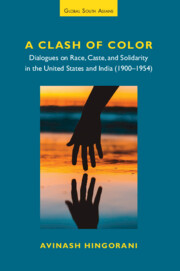 A Clash of Color
A Clash of Color Published online by Cambridge University Press: 28 November 2024
Between the 1910s and the 1930s, W. E. B. Du Bois attempted to build several alliances with Indians in his quest for transnational racial solidarity. While his “To the Nations of the World” address at the 1900 Pan African Congress was his first major example of internationalizing the Black struggle, his initial impact on Indians came at the First Universal Races in 1911. At the Congress Du Bois's speech entitled “The Negro Race in the United States of America” made a lasting impression on some Indians associated with the Gandhian movement. In his speech he sought to inform the international community about the problems of Black Americans in the hope that he could build international allies to sympathize with the Black American struggle. Du Bois argued that although the Civil War had formally ended slavery, White Americans in the US South were still “determined to deprive the Negroes of political power and force them to occupy the position of a labouring caste.” Du Bois came to the meeting armed with a plethora of statistics to prove that Black Americans were relegated to menial labor and were not equally represented in the higher divisions of labor. He gave additional examples of Black Americans being forced to attend underfunded schools and concluded that in addition to racism, a lack of educational funding was the greatest factor for Black Americans being denied the same career paths as their White counterparts.
Du Bois hoped to prove to the Congress that there was no real biological difference between races. White Americans simply chose to subjugate Black Americans to lower socioeconomic positions based on phenotypical features and skin color. He stressed that if Black Americans were offered a more democratic form of government and better educational facilities, they could eventually prove that there were no intellectual deficiencies amongst Black Americans in the US.
Although Gandhi did not attend the Congress, he sent his associate H. S. L. Polak, an English ally from South Africa, in his stead. The event was also attended by Indian National Congress leader Gopal Krishna Gokhale.
To save this book to your Kindle, first ensure no-reply@cambridge.org is added to your Approved Personal Document E-mail List under your Personal Document Settings on the Manage Your Content and Devices page of your Amazon account. Then enter the ‘name’ part of your Kindle email address below. Find out more about saving to your Kindle.
Note you can select to save to either the @free.kindle.com or @kindle.com variations. ‘@free.kindle.com’ emails are free but can only be saved to your device when it is connected to wi-fi. ‘@kindle.com’ emails can be delivered even when you are not connected to wi-fi, but note that service fees apply.
Find out more about the Kindle Personal Document Service.
To save content items to your account, please confirm that you agree to abide by our usage policies. If this is the first time you use this feature, you will be asked to authorise Cambridge Core to connect with your account. Find out more about saving content to Dropbox.
To save content items to your account, please confirm that you agree to abide by our usage policies. If this is the first time you use this feature, you will be asked to authorise Cambridge Core to connect with your account. Find out more about saving content to Google Drive.